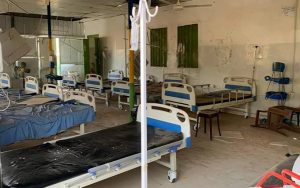MSF: Access to healthcare in Sudan ‘almost impossible’ as attacks on healthcare facilities increase
3 min read
Healthcare system collapses in Sudan as hospitals face relentless attacks
Sudan’s Healthcare System on the Brink Amid Relentless Attacks
Widespread Health Facility Collapse Across Sudan
In war-torn Sudan, the collapse of the healthcare system is becoming a humanitarian catastrophe. According to Médecins Sans Frontières (MSF), also known as Doctors Without Borders, access to medical care is now “almost impossible” due to a surge in targeted attacks on health facilities. In their latest report, titled “Besieged, Attacked, Starved,” MSF revealed that over 70% of hospitals and clinics across the country have either shut down completely or are barely functional. The few that still operate do so under continuous threat of violence, putting both patients and healthcare workers at risk.
Health Workers and Civilians Trapped in Crisis
The situation is especially dire for civilians seeking emergency care. MSF’s head of emergency operations, Michel-Olivier Lacharité, made a direct plea for warring factions to cease attacks on civilian infrastructure, specifically medical buildings. His statement underscored the urgency of the crisis: “We call to all warring parties to stop violence against the civilian health facilities and civilian infrastructure and to facilitate a large-scale humanitarian response.” The reality on the ground paints a grim picture — civilians, often already weakened by malnutrition and illness, are left with virtually no access to lifesaving services.
Soaring Civilian Casualties from Hospital Attacks
Save the Children, another international aid agency, reported that the number of attacks on hospitals has tripled within the first half of this year alone. In one of the most alarming figures, over 900 people have been killed while trying to receive or accompany someone for medical treatment — a shocking statistic that is 60 times higher than the same period last year. Ambulances, mobile clinics, and even clearly marked medical convoys have not been spared from the violence. These attacks come as half of Sudan’s population now requires humanitarian aid, including urgent medical assistance.
El Fasher: A City Without Surgical Care
El Fasher, the capital of North Darfur province, has become one of the deadliest zones for civilians in need of care. MSF specifically highlighted the city as an area where it is now “near impossible” for the population — including thousands of internally displaced people in surrounding camps — to access treatment. As of April, just one hospital with surgical capabilities remained partly operational, attempting to serve more than a million people. Over the past year, even patients and their caregivers have been killed inside MSF-supported hospitals, a chilling reminder that no place is safe in this conflict.

International Community Urged to Intervene
Beyond calling for peace among local actors, MSF directed strong criticism toward international players. Lacharité urged the global community to step up and use all diplomatic and political tools available to prevent further atrocities. He called on UN member states and other influential governments to stop enabling the war through military, financial, or political support, demanding they put civilian protection at the core of their foreign policy toward Sudan. “They must use all the leverage to prevent further mass atrocities,” he stressed, “and place protection of civilians at the core of their engagement with the warring parties.”
Ceasefire Efforts Undermined by Renewed Clashes
In a recent glimmer of hope, Sudan’s military agreed to a United Nations proposal for a week-long ceasefire in El Fasher to allow aid deliveries. However, the Rapid Support Forces (RSF), a rival paramilitary group, did not commit to the agreement. Instead, clashes between the two sides intensified again this week in the southern parts of the city, complicating any efforts to provide relief or rebuild health infrastructure.
Humanitarian Disaster Far From Over
Sudan’s civil war, which erupted in April 2023 following tensions between the army and RSF, has already claimed more than 40,000 lives, according to UN agencies. Over 13 million people have been displaced, both internally and across borders. For those who remain, survival is becoming increasingly difficult. Besides war injuries, people are now battling hunger, famine, and diseases like cholera, which are rapidly spreading due to the collapsed healthcare network. Aid groups continue to call for urgent action, but without a sustained ceasefire and international pressure, the situation is poised to deteriorate even further.





